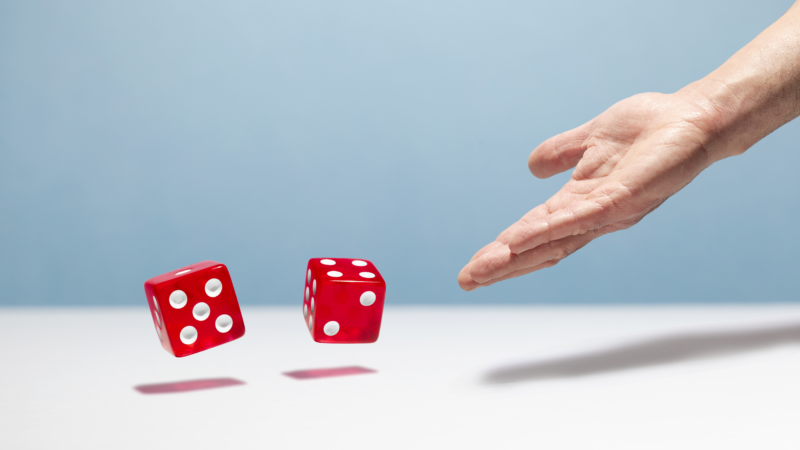Do you know the red flags for problem gambling?
For most people, betting on sports is recreational and responsible. But not for everyone.
And for people who have an addiction to gambling, the March Madness NCAA tournament can be a particularly challenging time.
“Everyone I know that gambles just goes crazy this time of year,” says a man named Scott. “From the conference tournaments through the national championship game.”
For Scott, problem gambling contributed to a financial crisis and a divorce. He’s been in recovery for months, but he says he’s not yet ready to talk about his struggle publicly and asked NPR to only use his first name. He acknowledges the stigma around problem gambling is widespread.
“It feels like a character defect,” he says.
Scott is a lifelong sports fan and high school coach. He says often people like him have a hard time disentangling gambling from their passion for sports.
“It’s something we love.”
Following a 2018 Supreme Court decision to legalize sports betting, gambling — online and in person — is more available than ever before in dozens of states across the US. Americans are expected to wager $3.1 billion on March Madness games this year, and overall the legal gaming industry will bring in $70 billion, according to the American Gaming Association.
Despite the proliferation of legal gambling opportunities, experts say many people do not have a clear understanding of what problem gambling looks like and how to address it.
How to recognize problem gambling
Addiction experts and researchers say the signs of gambling addiction are not as well known as those of drugs and alcohol, though it often co-exists with other addictions. Here are four of the signs of problem gambling:
- Preoccupation with gambling
- Gambling alone
- Trying to stop gambling and being unable to
- Feeling compelled to gamble more after losses
“It usually starts with — somebody’s really preoccupied with gambling,” says Michelle Malkin, director of the Gambling Research and Policy Initiative at East Carolina University in Greenville, N.C. She says often problem gambling stops being an activity people do with friends. “They wanna go gamble by themselves, whether at home or if they do gambling like at a casino.”
These behaviors can trigger the same neural pathways as substance use disorders,which eventually remodel the brain.
“Like they might try to stop, but they just can’t seem to stay stopped for very long,” says Malkin.
Often problem gamblers have unexplained debt, or take out loans but don’t use the money as they intend to, says Malkin.
Gambling disorders can lead to tragedy — failed relationships and careers, even suicide. Malkin calls this disordered thinking the “gambler’s fallacy.” In order to fix problems caused by gambling, says Malkin, people think they “just need to gamble more. And it becomes cyclical because then they are digging the hole deeper and deeper.”
What does help look like
Because states adopt their own laws on gambling, regulations and resources for people struggling with problem gambling vary significantly from state to state. The National Problem Gambling Help Line — 1-800-GAMBLER — connects people to local resources. Many states that have legal gambling direct some tax revenue to helping people pay for outpatient therapy.
There are a handful of inpatient treatment centers across the country, but insurance plans are generally less likely to cover them than inpatient treatment for other addictions, according to therapists.
“ It’s kind of an oxymoron,” says Jody Bechtold, a therapist who specializes in treating people with gambling addiction. “Your finances are so devastated, but do you have $10,000 to go to rehab?”
Bechtold and other experts recommend finding a therapist – inpatient or outpatient – with training specifically in gambling disorders.
“Like 60 percent is the same with all addictions,” says Bechtold. “But there is another 40 percent that is really, really different.”
For example, says Bechtold, problem gamblers don’t ingest anything: “It’s not self-limiting. You don’t pass out because you had too much.”
Understanding patients’ access to finances is important, as well as knowing how to help people find tools that could help them block gambling apps on their phones or opt them out of communication from gambling companies.
“These are things that are not addressed in other kinds of addiction treatment,” says Bechtold.

Many people who are in recovery stress the importance of finding support groups.
“You have to find human connection,” says Scott, the lifelong sports fan who is now in recovery. “Even if it’s just one person at the beginning.”
Gamblers Anonymous is an organization akin to Alcoholics Anonymous. Not every place in the U.S. has an in-person meeting; the organization also has virtual meetings.
Scott says he looked to online message boards — places like Reddit , where one community has tens of thousands of participants — to find solidarity with people struggling with the same problem.
How to rebuild a life after gambling
Jeffrey Wasserman is in recovery after losing his career as a lawyer due to gambling and he now runs an online support group for the problem. He says for sports fans, quitting sports betting is especially difficult.
“ So now you’re asking me to give up the two things in life that I love the most,” says Wasserman, “gambling and sports.”
Wasserman compares gambling to an eating disorder. Just like learning to be around food, people need to learn to be around money or, in the case of sports betting — sports. For some, he says, it may be the case that any kind of sports consumption is just too triggering. But some people are able to successfully find a way to continue engaging with their love of competition and sports. He says start small — try a week-long break or record a game in order to prevent yourself from betting on the results.
“ Like anything else, you can approach it in a measured way,” says Wasserman.
Wasserman and other experts stress that recovery from problem gambling is possible but ultimately means adopting a new mind set.
Strategies like limiting access to money or gambling apps, he says, are short term.
With relapse as easy as picking up a phone and pressing a few buttons, says Wasserman, these tools are critical, “but the reality is – it’s for people to get them through a rough period of time where they’re more vulnerable,” he explains.
“The hope is that what they’ve learned in recovery will help them in thinking about how they want to be, what kind of reputation they want to have — how they want to live their life.”
If you or someone you know is in crisis, call, text or chat 988 for the Suicide & Crisis Lifeline.
For specific help with problem gambling, call 1-800-GAMBLER.
Transcript:
MICHEL MARTIN, HOST:
Maybe you’re still smarting over your March Madness fails or celebrating your wins, and maybe you put some money on it. If you did, you wouldn’t be alone. Americans were expected to bet $3 billion on the tournament this year alone. But when does sports betting become a problem? NPR’s Katia Riddle has this report.
KATIA RIDDLE, BYLINE: To be clear, most people who gamble enjoy it responsibly, but not everyone. This man’s name is Scott. He’s a lifelong sports fan and a high school coach. He says people like him have a hard time disentangling gambling from their passion for sports.
SCOTT: Because it’s something that we love.
RIDDLE: March Madness, he says, is extra difficult.
SCOTT: Everyone I know that gambles just goes crazy this time of year, from the conference tournaments through the national championship game.
RIDDLE: Scott asked that NPR just use his first name for this story. He’s been in recovery for a few months. He says he’s not ready to face the stigma around problem gambling that he would encounter if he talked about it publicly.
SCOTT: It feels like a character defect. It feels like I’d be admitting to being stupid.
RIDDLE: A lot more people are legally gambling in recent years. Sports betting is now legal in roughly two-thirds of the country. Some online gambling platforms also have casino games, like blackjack and roulette. Michelle Malkin is the director of the Gambling Research and Policy Initiative at East Carolina University. She says unlike drugs and alcohol, many people don’t know the signs of gambling addiction.
MICHELLE MALKIN: It usually starts with, like, somebody who’s really preoccupied with gambling. They want to go gamble by themselves, whether at home or if they do gambling, like, at a casino, but they don’t tend to do it as a social activity anymore.
RIDDLE: These behaviors can trigger the same neural pathways as substance use disorders.
MALKIN: Like, they might try to stop, but they just can’t seem to stay stopped for very long.
RIDDLE: Gambling disorders can lead to tragedy, failed relationships and careers, even suicide. Malkin calls it the gambler’s fallacy.
MALKIN: That to fix these problems that have been caused by gambling, I just need to gamble more, and it becomes cyclical ’cause then they are digging the hole deeper and deeper.
RIDDLE: There are some outpatient therapists who specialize in gambling addiction. There are also a small number of programs around the country that do inpatient treatment. Many people say the first step – find a support group. Here’s Scott.
SCOTT: You have to find connections. I mean, you have to find human connections.
RIDDLE: Gamblers Anonymous is an organization like Alcoholics Anonymous, but not every place in the U.S. has a meeting. Scott says he had to look to online message boards, places like Reddit, to find people struggling with the same problem.
SCOTT: Even if it’s one person at the beginning.
RIDDLE: Jeffrey Wasserman runs an online support group for people struggling with gambling. He says quitting sports betting is especially difficult.
JEFFREY WASSERMAN: So now you’re asking me to give up the two things in life that I love the most – and that is gambling and sports.
RIDDLE: He compares it to an eating disorder. Just like learning to be around food, people can learn to be around sports. He says, start small. For example, try a weeklong break or record a game so you’re not tempted to bet on the results.
WASSERMAN: Like anything else, you can approach it in a measured way.
RIDDLE: A measured way to get back to a love of the game without the risk of losing everything.
Katia Riddle, NPR News.
Dozens presumed dead in fire at Swiss Alps bar during New Year’s celebration
Dozens of people are presumed dead and about 100 injured, most of them seriously, following a fire at a Swiss Alps bar during a New Year's celebration, police said Thursday.
Warren Buffett officially retires as Berkshire Hathway’s CEO
The legendary 95-year-old investor spent decades building his company into one of the world's largest and most powerful. Now Greg Abel is taking it over.
Crypto soared in 2025 — and then crashed. Now what?
For most of 2025, cryptocurrencies such as bitcoin surged as President Trump vowed to make the U.S. a crypto leader. But now, a severe sell-off has shaken the sector.
Zohran Mamdani sworn in as New York City mayor, capping historic rise
Mayor Zohran Mamdani took the oath of office in New York City after midnight Thursday. The city's first Muslim mayor, a member of the Democratic Socialists of America, has promised to focus on affordability and fairness.
Rising from the ashes, a symbol of hope at the Rose Parade
Survivors of the Eaton and Palisades Fires find healing and community working on a Rose Parade float to honor the lives and communities lost in last year's wildfires.
The history behind the NYC subway station chosen for Mamdani’s swearing-in
The city shut down the station in 1945 on New Year's Eve. Eighty years later, it's a symbolic venue choice for the incoming mayor's private swearing-in ceremony.







